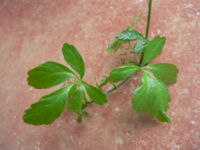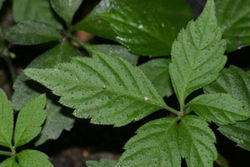Jiaogulan
2007 Schools Wikipedia Selection. Related subjects: Plants
| iGynostemma pentaphyllum | ||||||||||||||||||
|---|---|---|---|---|---|---|---|---|---|---|---|---|---|---|---|---|---|---|
 |
||||||||||||||||||
| Scientific classification | ||||||||||||||||||
|
||||||||||||||||||
|
|
||||||||||||||||||
| Gynostemma pentaphyllum ( Thunb.) Makino 1902 |
Gynostemma pentaphyllum, also called Jiaogulan (Chinese: 绞 股 蓝; pinyin: jiǎogǔlán) or Southern ginseng, is an herbaceous vine of the family Cucurbitaceae ( cucumber or gourd family) indigenous to the southern reaches of China.
The plant is best known for its use as an herbal medicine in traditional Chinese medicine. It is described by the local people as the immortality herb, because people within the Guizhou Province, where jiaogulan tea is drunk regularly, have a history of living to a very old age.
It was used as a natural sweetener in Japan and is known as an adaptogen and antioxidant. Due to its adaptogenic effects it is frequently referred to as "Southern Ginseng." Its adaptogenic constituents are gypenosides which are closely structurally related to the ginsenosides from the well known medicinal plant ginseng. It is also purported to lower cholesterol levels.
Jiaogulan is a vine hardy to USDA zone 8 in which it may grow as a short lived perennial plant; in lower zones it can be grown as an annual. The plant is dioecious, meaning each plant exists either as male or female, thus if seeds are desired both a male and female plant must be grown.
Other names for jiaogulan include amachazuru, Gynostemma pentaphyllum, Miracle Grass, Southern Ginseng, Vitis pentaphyllum, and Xianxao. One U.S.-based company markets jiaogulan under the name "Panta," but this name does not seem to be derived from any Asian language; instead, the name most likely comes from the plant's Latin name.
